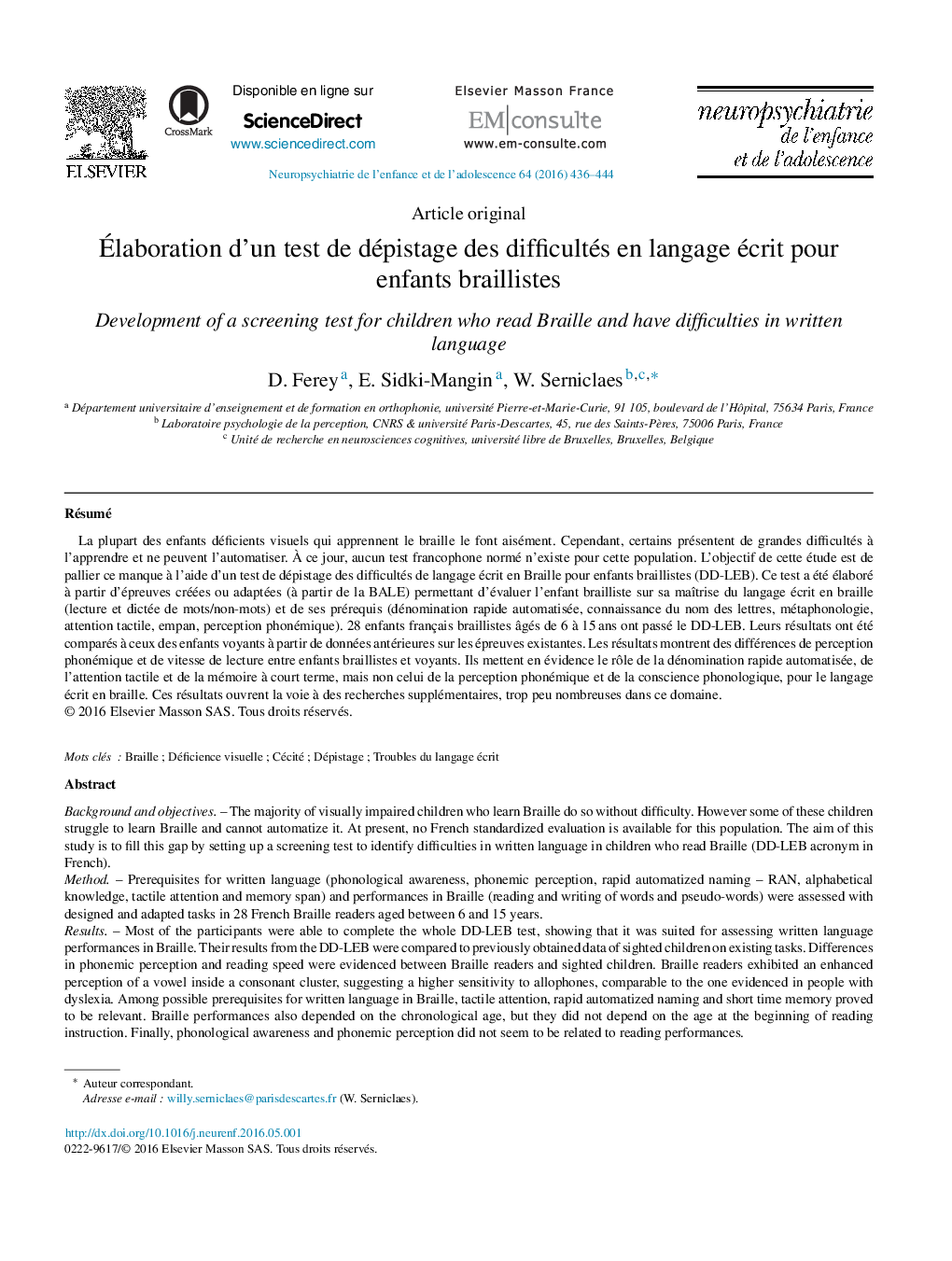| کد مقاله | کد نشریه | سال انتشار | مقاله انگلیسی | نسخه تمام متن |
|---|---|---|---|---|
| 5044930 | 1370641 | 2016 | 9 صفحه PDF | دانلود رایگان |

RésuméLa plupart des enfants déficients visuels qui apprennent le braille le font aisément. Cependant, certains présentent de grandes difficultés à l'apprendre et ne peuvent l'automatiser. à ce jour, aucun test francophone normé n'existe pour cette population. L'objectif de cette étude est de pallier ce manque à l'aide d'un test de dépistage des difficultés de langage écrit en Braille pour enfants braillistes (DD-LEB). Ce test a été élaboré à partir d'épreuves créées ou adaptées (à partir de la BALE) permettant d'évaluer l'enfant brailliste sur sa maîtrise du langage écrit en braille (lecture et dictée de mots/non-mots) et de ses prérequis (dénomination rapide automatisée, connaissance du nom des lettres, métaphonologie, attention tactile, empan, perception phonémique). 28 enfants français braillistes âgés de 6 à 15 ans ont passé le DD-LEB. Leurs résultats ont été comparés à ceux des enfants voyants à partir de données antérieures sur les épreuves existantes. Les résultats montrent des différences de perception phonémique et de vitesse de lecture entre enfants braillistes et voyants. Ils mettent en évidence le rôle de la dénomination rapide automatisée, de l'attention tactile et de la mémoire à court terme, mais non celui de la perception phonémique et de la conscience phonologique, pour le langage écrit en braille. Ces résultats ouvrent la voie à des recherches supplémentaires, trop peu nombreuses dans ce domaine.
Background and objectivesThe majority of visually impaired children who learn Braille do so without difficulty. However some of these children struggle to learn Braille and cannot automatize it. At present, no French standardized evaluation is available for this population. The aim of this study is to fill this gap by setting up a screening test to identify difficulties in written language in children who read Braille (DD-LEB acronym in French).MethodPrerequisites for written language (phonological awareness, phonemic perception, rapid automatized naming -Â RAN, alphabetical knowledge, tactile attention and memory span) and performances in Braille (reading and writing of words and pseudo-words) were assessed with designed and adapted tasks in 28 French Braille readers aged between 6 and 15 years.ResultsMost of the participants were able to complete the whole DD-LEB test, showing that it was suited for assessing written language performances in Braille. Their results from the DD-LEB were compared to previously obtained data of sighted children on existing tasks. Differences in phonemic perception and reading speed were evidenced between Braille readers and sighted children. Braille readers exhibited an enhanced perception of a vowel inside a consonant cluster, suggesting a higher sensitivity to allophones, comparable to the one evidenced in people with dyslexia. Among possible prerequisites for written language in Braille, tactile attention, rapid automatized naming and short time memory proved to be relevant. Braille performances also depended on the chronological age, but they did not depend on the age at the beginning of reading instruction. Finally, phonological awareness and phonemic perception did not seem to be related to reading performances.PerspectivesThese results pave the way for further research, which is currently lacking in this area. More data are needed in order to define standardized norms for the DD-LEB, taking account of the education level. These norms could be used by speech and language pathologists to assess and guide rehabilitation. Also, various questions remain about the nature of mechanisms in Braille, the role of phonological awareness and phonemic perception for learning to read and write in Braille, and more widely about the question of the potential existence of dyslexia in Braille. One of these questions pertains to the role of phonological awareness and phonemic perception for learning to read in Braille. The present study did not evidence a relationship between the quality of phonemic representations and reading performances with Braille, an intriguing result which needs further research.
Journal: Neuropsychiatrie de l'Enfance et de l'Adolescence - Volume 64, Issue 7, November 2016, Pages 436-444